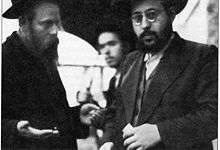Baruch Yehoshua Yerachmiel Rabinowicz
Grand Rabbi Baruch Yehoshua Yerachmiel Rabinovich (1914–1997), was born into a distinguished chassidic dynasty, and succeeded to the title Munkacser Rebbe.
Baruch Yehoshua Yerachmiel Rabinowicz | |
|---|---|
 Rabbi Baruch Rabinovich (right) | |
| Title | Munkacser Rebbe |
| Personal | |
| Born | Baruch Yehoshua Yerachmiel Rabinovich/wicz/wich [var.] September 25, 1914 Siedlce, Poland |
| Died | December 26, 1997 Petah Tikva, Israel |
| Religion | Judaism |
| Spouse | Chaya Frima Rivka daughter of Chaim Elazar Spira, Yehudis Wallhaus |
| Children | Tzvi Nosson Dovid Rabinovich (dec.) Chaim Elazar Rabinovich (dec.) Moshe Leib Rabinovich Yitzchok Yakov Rabinovich Yita Wilamowsky, Rachel L'via Grossman (dec.) Meir Betzalel Yair Rabinovich |
| Parents | |
| Jewish leader | |
| Predecessor | Chaim Elazar Spira |
| Successor | Moshe Leib Rabinovich, Yizchok Yakov Rabinovich |
| Began | 1937 |
| Ended | 1946 |
| Main work | Binas Nevonim |
| Dynasty | Munkacs |
Early years
Boruch Yehoshua Yerachmiel was born in Russia in 1914 to his parents, Rabbi Nosson Dovid Rabinovich (1868–1930), the Partzever Rebbe, and Yitta Spira. His father was the eldest son of Rabbi Yitzchak Yaakov of Biala (1847–1905). His mother was the daughter of Rabbi Moshe Leib Spira of Stryzow (1850–1916), of the Munkacs dynasty. He was engaged to his intended bride at the age of 11. When he was 13, his father-in-law-to-be, Rabbi Chaim Elazar Spira of Munkacs, took him on a visit to the Holy Land.
Marriage
In 1933 Rabbi Boruch married Frima Chaya Rivka, the only daughter of his mother's first cousin, Rabbi Chaim Elazar Spira (1872–1937), Munkacser Rebbe and Chief Rabbi of Munkacs, also known as the 'Minchas Elazar'. This union set him on course to succeed his father-in-law as rabbi and 'Admor' of Munkacs. His wedding – attended by some 20-30,000 guests - was one of the grandest and most celebrated chassidic weddings of 1933 and film footage of the wedding, shot by news teams who were there to record the event, was seen widely across the world. It is also searchable on the web site of the United States Holocaust Memorial Museum, and is on display at the Museum of Jewish Heritage in New York City.
Rabbi of Munkacs
Rabbi Boruch's elevation to the position as rav and rebbe of Munkacs in 1937 following the death of his father-in-law was rudely disrupted by the beginning of World War II, when he was unceremoniously deported to Poland. He was miraculously released soon afterwards and he promptly moved with his family from Munkacs to Budapest, where he managed to obtain visas and escape to Palestine. There he endeavoured to rebuild his shattered life but, as well as having to deal with the tragedy of the Holocaust and the deaths and disruption it had caused, his wife - always of frail health - died in April 1945.
Post-war
In 1946, Rabbi Boruch tried to become the Chief Rabbi of Tel Aviv, but retired from the race, not wanting to compete against the other contenders. In 1947, he moved to São Paulo, Brazil,[1] together with his second wife, Yehudis, in this way totally cutting himself off from his surviving chasidim and from his position as head of one of pre-war Hungary's pre-eminent chasidic dynasties. In addition, as a result of a change of theological direction, Rabbi Boruch had become sympathetic to Zionism and the State of Israel, concepts that had been anathema to his father-in-law and most of pre-War Hungarian Haredi orthodoxy. The Munkatcher chasidim who had survived the war did not like the fact that he was too "modern" for them so they crowned his son Reb Moshe Leib, the current Munkatcher Rebbe, in his place.
Rabbi Boruch returned to Israel in 1963 to become Chief Rabbi of Holon. He later moved to Petah Tikva where he headed a small Beis Hamedrash until his death in 1997. His third son, Rabbi Moshe Leib Rabinovich, is the Rebbe of Munkacs and resides in the Boro Park section of Brooklyn, New York. His fourth son, Rabbi Yizchok Yakov Rabinovich is the Rebbe of Dinov and resides in the Williamsburg section of Brooklyn, NY. His second son, Chaim Rabinovich, lived in Jerusalem after spending most of his life in Vienna and South America, and died in 2013.
Rabbi Boruch was known as a great scholar of Talmud and halacha and his encyclopedic knowledge of traditional Jewish sources was widely reputed. In addition to this, he was also a gifted orator, although his relative obscurity and personal desire to remain out of the limelight meant that he rarely spoke outside of his own immediate vicinity. In 1996, he published his works entitled Divrei Nevonim and Binat Nevonim.